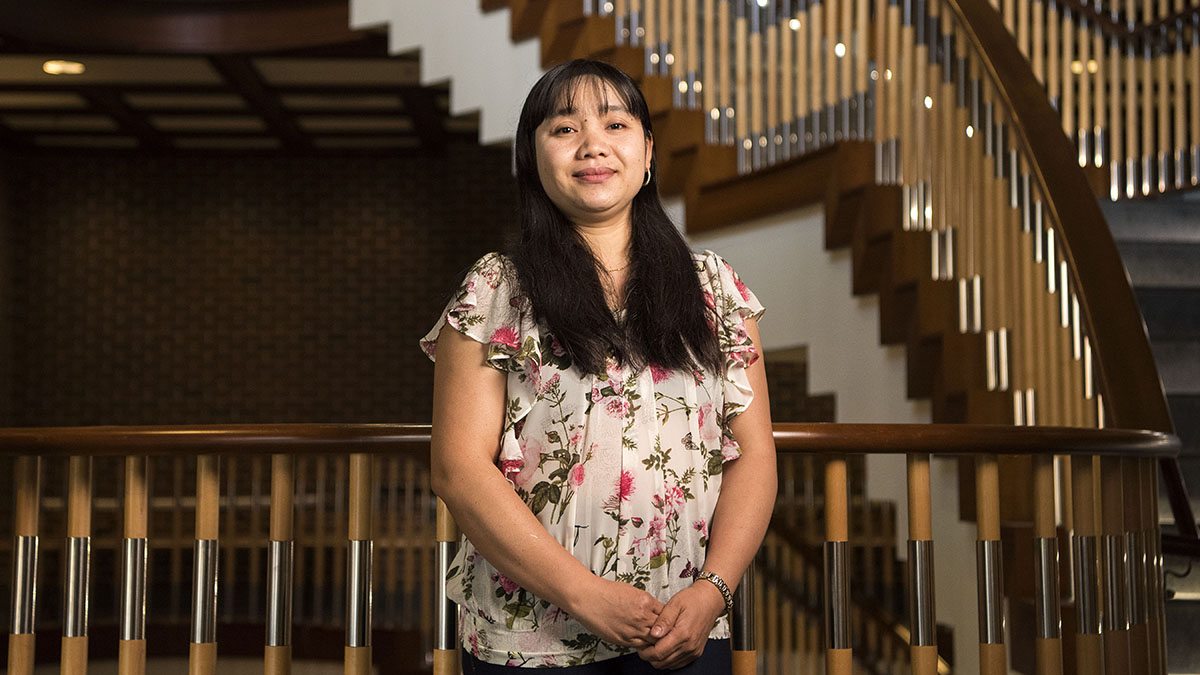A grateful heart
Massey Award winner Nan Kham built a new life in Chapel Hill after fleeing political persecution in Myanmar.

Even before Nan Kham knew she had won a C. Knox Massey Distinguished Service Award, she already understood she had much to be grateful for.
Indeed, nearly all of the good things that have happened to her in her 39 years were things not within her reach to even dream growing up in a rural village in Myanmar where her parents made a living on their tea leaf farm.
She believed she would live and die in that same village, working alongside her parents on their farm. The idea of leaving her country for America never crossed her mind.
The big surprise
And 11 years ago, when she and husband Thaung Htaik arrived in Chapel Hill seeking work as University housekeepers, she had no thought of ever winning a Massey award. She did not even know what a Massey award was until the phone rang this spring with the news she had won one.
“It was a big surprise,” Kham said. “I was so excited I could not sleep.”
As she stood to speak at the awards banquet weeks later, she was so nervous her hands shook as she read from the paper listing all the people she wanted to thank. “I shake because I never speak in front of people. I am so excited my heart was going thump, thump, thump,” she said.
More than 70 people from where she works nominated her. In their nominating letters, many described her big smile and how cheerful Kham always was. Wrote one, “It is a pleasure to witness the pride, joy and sense of accomplishment Nan brings to her work.”
A shared purpose
Kham is among a growing contingent of refugees from the war-torn country of Myanmar who have found both a safe haven—and a home—working as housekeepers in Facili- ties Services, said Timothy Carville, Kham’s zone manager in Housekeeping Services.
“The students and the faculty members recognize how good a worker Nam is,” said Carville, who was also quick to point out that the 15 other housekeepers who work in Taylor Hall are no less dedicated to their work.
Completed in 1968, Taylor Hall is named for Isaac Taylor, the dean of the medical school from 1964 to 1971. Today, it is home to a range of science departments, including anesthesiology, biomedical engineering, cell biology and physiology, pediatrics and psychiatry.
Housekeepers who work there, Carville said, believe their work keeping the place clean helps students and faculty do their work in cutting-edge science. But while joined in common shared purpose, the housekeepers from Myanmar do not share the same identity, language or cultural history, Carville said. To show each of them proper respect, it is important to understand and recognize those differences, he added.
“Nan is not Burmese,” Carville said. “She is not Karen. She is Shan.”
A new home
Shan is one of more than 130 recognized ethnicities in Myanmar.
Kham’s village was part of the Shan State, a region of Myanmar that was once an independent nation with its own king and queen. It was vanquished and incorporated into the British colony known as Burma. Burma won independence from Britain in 1948, but the Shan State was again subjugated by the brutal military regime that took over the country in 1962.
That same military junta changed the country’s name to Myanmar in 1989, a year after thousands were killed during the suppression of a popular uprising that Htaik joined as a student at the Rangoon Arts and Science University (now Yangon University).
Htaik fled Rangoon to escape the government crackdown but returned to the city in 1991 to join a protest group supporting Aung San Suu Kyi, the popular political leader put under house arrest after her party won the 1990 general election.
That decision cost him dearly. Military intelligence officers arrested Htaik on Dec. 23, 1991. Without a trial, he was sen- tenced to prison. “He was 25 when he went to jail and he lived in jail for 11 years,” Kham said.
After his release, Htaik stayed on the run to keep one step ahead of police. If not for that, Kham said, he never would have showed up one day at her parents’ tea tree farm and they would never have met and fell in love. By 2003, they were married. Soon after, her husband disappeared—about the time she discovered she was pregnant.
“Every day I go to the farm I cry,” Kham said. “I love him and I wanted to be with him.”
She did not know until weeks later where he had gone or why. While visiting in Rangoon, Htaik was warned by his father that government soldiers had come looking for him. Two months after she last saw him, her husband called on his cell phone from a refugee camp in Thailand.
“Come with me,” he said.
She did, and so began their journey together to America— from a refugee camp in Thailand to Dallas, Texas, then to Nashville, Tennessee, and finally Chapel Hill.
“UNC is like a home to me,” Kham said. “Everyone is nice to each other here.”
Their daughter, Nin Eindra Hlaing, was born in Thailand and is now 13. This fall, she will begin 8th grade at McDougle Middle School in Chapel Hill. Already, Kham said, her daughter knows her dream.
“She would like to go to UNC and become a scientist when she grows up.”




